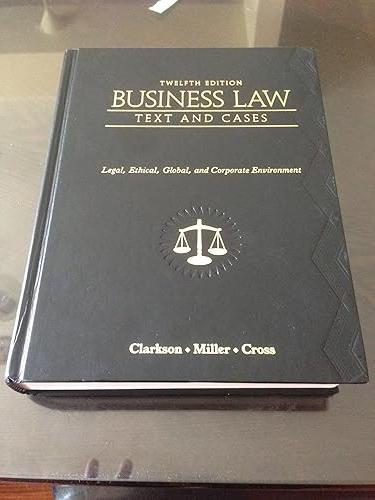Taser International develops and manufactures electronic control devices, commonly called stun guns, and accessories for electronic control
Question:
Taser International develops and manufactures electronic control devices, commonly called stun guns, and accessories for electronic control devices, including a personal video and audio recording device called TASER CAM. Taser sells its products to the military, law enforcement, corrections, private security, and the general public.
[Steve] Ward was employed full-time with Taser from January 1, 2004, to July 24, 2007, and served as Taser’s vice president of marketing during the time relevant to this appeal. He was an at-will employee,b and he did not sign any employment contract, non-compete agreement, or non-disclosure agreement.
* * * *
In December 2006, Ward began exploring whether he could personally develop the concept of an eyeglass-mounted camera. He sought legal advice about whether he could permissibly develop such a camera independent of Taser, and hired patent counsel to conduct a patent search on the idea.
Between April 2007 and his resignation approximately four months later, Ward shifted his exploration to the concept of a clip-on camera device, after learning that the eyeglass- mounted concept was already patent protected. He directed patent counsel to conduct a patent search on the modifi ed idea. He communicated with JAM-Proactive, a product development company, about the design and development of a clip-on camera device, and he received a detailed product development proposal from JAM-Proactive on June 12, 2007. Prior to his resignation, Ward planned to leave Taser to form a new business, and completed substantial work on a business plan to develop, market, and sell a clip-on camera device.
Ward resigned on July 24, 2007.
* * * He formed Vievu LLC on August 23, 2007, and Vievu now markets a clip-on camera device to general consumers and law enforcement. Ten months after Ward resigned, Taser announced the AXON, a product that provides an audio-video record of an incident from the visual perspective of the person involved.
[Taser fi led a suit against Ward in an Arizona state court alleging, among other things, that Ward had breached his duty of loyalty to Taser.
Taser moved for summary judgment in its favor, which the court granted.
Ward appealed.]
* * * *
“In Arizona, an employee/agent owes his or her employer/principal a fi duciary duty.” “It is too plain to need discussion that an agent is under the duty to act with entire good faith and loyalty for the furtherance of the interests of his principal in all matters concerning or affecting the subject of his agency, and if he fails to do so, he is responsible to his principal for any loss resulting therefrom.”
[Emphasis added.]
One aspect of this broad principle is that an employee is precluded from actively competing with his or her employer during the period of employment.
Although an employee may not compete prior to termination, “[the employee] may take action [during employment], not otherwise wrongful, to prepare for competition following termination of the agency relationship.” Preparation cannot take the form of “acts in direct competition with the employer’s business.”
The line separating mere preparation from active competition may be diffi cult to discern in some cases, and we must “focus on the nature of the defendant’s preparations to compete.”
[Emphasis added.]
* * * *
It is undisputed that, prior to his resignation, Ward did not solicit or recruit any Taser employees, distributors, customers, or vendors;
he did not buy, sell, or incorporate any business; he did not acquire offi ce space or other general business services; he did not contact or enter into any agreements with suppliers or manufacturers for his proposed clip-on camera; and he did not sell any products. However, Ward did begin developing a business plan, counseled with several attorneys, explored and abandoned the concept of an eyeglass-mounted camera device, and engaged, to some extent, in the exploration and development of a clip-on camera device.
Ward argues that his pretermination activities did not constitute active competition but were merely lawful preparation for a future business venture. Taser contends, however, that “this case is not about just investigating computer software, acquiring a line of credit, securing offi ce space, or getting prices on telephones * * *
[but] about developing a rival design during employment, knowing full well TASER has sold such a device and continues to develop a secondgeneration product.”
Upon review, we agree with Ward that certain of his pre-termination activities are qualitatively different than “direct competition” and cannot form the basis for liability.
* * * *
However, assuming Taser was engaged in the research and development of a recording device during Ward’s employment, assuming Ward knew or should have known of those efforts, and assuming Taser’s device would compete with Ward’s concept, substantial design and development efforts by Ward during his employment would constitute direct competition with the business activities of Taser and would violate his duty of loyalty. In the context of a business which engages in research, design, development, manufacture, and marketing of products, we cannot limit “competition” to just actual sales of competing products.
Summary judgment on this theory is nevertheless improper because a genuine issue of material fact exists as to the extent of Ward’s pre-termination design and development efforts.
* * * *
For the foregoing reasons, we reverse the grant of summary judgment entered in favor of Taser
* * * and remand for further proceedings.
Questions:-
1. Why was it unclear whether Ward’s pretermination actions constituted direct competition with his employer or were mere planning activities?
2. Suppose that Ward’s planning and development efforts were focused on a product that in no way would compete with Taser’s products. Would such efforts have breached his duty of loyalty to Taser in any way? Explain fully.
Step by Step Answer:

Business Law Text And Cases Legal Ethical Global And Corporate Environment
ISBN: 9780538470827
12th Edition
Authors: Kenneth W. Clarkson, Roger LeRoy Miller, Frank B. Cross





